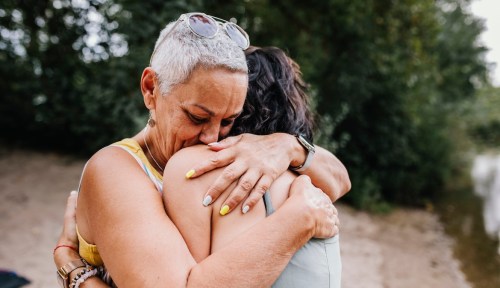Our editors independently select these products. Making a purchase through our links may earn Well+Good a commission
Making a Murderer. The Staircase. Conversations with a Killer: The Ted Bundy Tapes. The Jinx. The Keepers. Abducted in Plain Sight. O.J.: Made in America.
This is just a quick selection—honestly a mere fraction—of all the true-crime series and documentaries that have become binge-watchable cultural phenomenons of sorts. And when you’re not watching the often murderous content, you can listen to podcasts about the stories (My Favorite Murder, Serial) or read books about them (I’ll Be Gone in the Dark, A Serial Killer’s Daughter).
While offerings of the genre are pervasive and plentiful across platforms, many still can’t consume enough of it. But why do so many people crave this dark-leaning form of escapism—is any part of it relatable? Weirdly exciting? Alluring, even? According to clinical and forensic psychologist Paula E. Bruce, PhD, a large part is because reality can actually be stranger than fiction. “True-crime shows are compelling to many because they can provide a window into a reality that we do not readily have access to,” she says.
“True-crime shows are compelling to many because they can provide a window into a reality that we do not readily have access to.” —Paula E. Bruce, PhD
And given that the victims of the brutal and violent crimes covered (including rape, torture, and murder) are often female, it’s worth noting that research points to women also being the biggest fans of the genre. According to Dr. Bruce, that’s no coincidence. “Women, in general, are more attuned to the possibility of being a victim,” she says.
Psychology professor Kareem Johnson, PhD, contextualizes this by noting the specific type of violent content we enjoy correlates with the type most likely to affect us. One component of this is voyeurism, but another, says Dr. Bruce, is a subconscious inclination for honing survival techniques and preparing for potential scary situations one may face. “There is some relief in being able to visualize how a personal trauma could happen, with the fantasy that there are clues along the way to prevent it or the possibility of figuring out how to survive it,” she says.
Dr. Bruce adds that female consumers of true crime can visualize themselves in a similar situation and wonder what they would do, or what they should pay attention to. “This is really about control and wanting to achieve mastery of a situation,” says Dr. Bruce. And for victims of violent crimes who absorb the content, the effects can even skew therapeutic. For example, a given show may take away some of their abuser’s power. “Revisiting a traumatic event can make the intensity of the event less so,” says Dr. Johnson.
True crime can also offer a sense of validation when the subject matter hits close to home. “It may allow some women who have been victims of crime to feel relief in observing how much worse their situation could have been or in validating that a person they thought was dangerous really could have been,” says Dr. Bruce. The caveat here, she adds, is that it can be rather triggering by enhancing a feeling of lacking safety.
“If we can’t understand why these killers do what they do, that fear is never abated. If we can wrap our minds around it, it somehow seems less frightening.” —Scott Bonn, PhD, criminologist and author
Of course, these aren’t the you may find yourself watching so. much. true crime. After all, firing up the latest in greatest in the worlds of horror and murder might well be part of your hygge routine.
For many, the need for closure or a better understanding of those who commit the unthinkable crimes (which often remain unsolved or at least up for debate) can be what keeps us tuned in. “If we can’t understand why these killers do what they do, that fear is never abated,” says Scott Bonn, PhD, a criminologist and author of Why We Love Serial Killers: The Curious Appeal of the World’s Most Savage Murderers. “If we can wrap our minds around it, it somehow seems less frightening.”
To this point, he says these tales tend to follow a formulaic pattern for a reason: tapping into our worst fears, creating a compelling narrative, and providing a sense of security and relief by watching from a distance—and that’s largely why so many come back for more and more.
The DNA of true-crime shows makes them addictive by nature, and while binge-watching in its own right is largely innocuous health-wise, Dr. Johnson worries that the satisfying effect to be gleaned from this genre can diminish over time and lead to not-so-great effects. Whether it’s relief, closure, or pure entertainment that appeals to you, if you find yourself compulsively chasing more murder content that might be increasingly intense or horrific, it could be cause for concern.
If compulsive watching is affecting your daily functions, therapy may be a consideration. But, if you’re simply intrigued by and not necessarily addicted to true crime, Dr. Bruce says it’s A-okay to keep watching and solving all the mysteries.
Related, here’s why the “Watch It Again” section of Netflix is the most dangerous place on the internet. And if you want new content to stream, try these women-led picks.
Sign Up for Our Daily Newsletter
Get all the latest in wellness, trends, food, fitness, beauty, and more delivered right to your inbox.
Got it, you've been added to our email list.











